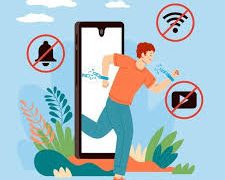In a world overflowing with digital noise—constant notifications, endless content, and screen overload—minimalism has emerged as more than just an aesthetic. It’s a lifestyle shift, a mindset, and a powerful antidote to digital overwhelm.
📱 The Digital Overload Problem
We live in an era where we:
- Check our phones 96 times a day (on average).
- Juggle multiple apps, tabs, emails, and platforms.
- Consume content faster than we can process it.
This digital saturation isn’t just distracting—it’s draining our time, focus, and peace of mind.
🧘♂️ What Is Digital Minimalism?
Digital minimalism is the intentional practice of simplifying your digital life. It means using technology mindfully—only tools and platforms that add real value—and cutting the rest.
Coined by author Cal Newport, digital minimalism isn’t about ditching all tech. It’s about reclaiming control and using tech with purpose.
✅ Benefits of Digital Minimalism
- More focus & clarity
Fewer distractions = better deep work and mental space. - Less stress & anxiety
Constant alerts can trigger stress; reducing them boosts calm. - Improved relationships
Less screen time often means more presence with people. - Better sleep & health
Limiting screen exposure, especially at night, enhances rest.
💡 Tips to Practice Digital Minimalism
1. Audit Your Digital Habits
Track where your time goes. Which apps or sites bring value? Which drain you?
2. Declutter Your Devices
Delete unused apps, clean your inbox, and organize your files. A tidy phone = a tidy mind.
3. Turn Off Non-Essential Notifications
Silence anything that isn’t urgent. The fewer interruptions, the better.
4. Set Screen-Time Boundaries
Use tools like Focus Mode or app timers. Designate tech-free hours or zones.
5. Be Intentional With Social Media
Unfollow, mute, or take breaks. Use it to connect, not scroll endlessly.
6. Embrace “Analog” Alternatives
Write in a journal. Read a paperback. Have a phone-free meal.
🔄 Shift from Passive to Purposeful
Minimalism in the digital age isn’t about deprivation—it’s about intentionality. When we strip away the unnecessary, we gain more time, focus, and energy for what truly matters.
You don’t need to go off-grid to benefit. Start small, stay consistent, and remember: less really can be more.

































































